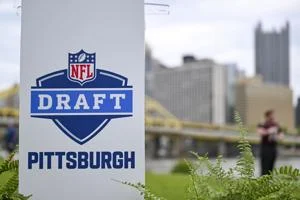Philadelphia had a decrease of 1,700 hotel room nights and a $1 million increase in hotel revenue when it hosted the 2017 NFL Draft, according to a new academic paper studying draft host cities.
The data comes despite claims that the draft led to nearly 19,000 additional hotel nights from event organizers.
The paper from economist E. Frank Stephenson of Georgia’s Berry College, shared with The Center Square, examined hotel data from NFL Draft hosts since the draft moved from New York City to Chicago in 2015 heading into Pittsburgh hosting the event in 2026.
Stephenson examined data from the three nights of the draft along with the night before and after the draft, showing a hangover effect that economists often see as fewer visitors than normal visit a city in the days after a large event. The Philadelphia draft coincided with that year’s Penn Relays.
Pittsburgh event organizers have said the draft will lead to an influx of spending and more than $120 million in economic impact. Stephenson’s data, however, showed the draft consistently leads to meager hotel revenue increases and diverted spending from local residents.
The night before the Philadelphia draft, there was a $750,000 increase in hotel revenue and rooms (1,562) along with a larger first-night increase of 2,600 and $870,000 before a third-night dropoff and 2,500 less hotel rooms occupied in the city the day after the draft.
“The total effect is a decrease of about 1,700 room nights so the results do not support claims that the draft led to over 18,000 room nights of additional hotel occupancy,” Stephenson wrote.
The Philadelphia impact was compared to that of an Eagles’ home game, which leads to 1,800 more rooms and $570,000 in additional hotel revenue.
Similar results were in the other draft host cities outside of Las Vegas, which had nearly 20,000 less hotel rooms rented but at much higher prices during the 2022 draft.
“While economic impact claims about hosting the draft are unrealistic, choosing to host the draft might well be a sensible decision for many cities,” Stephenson wrote. “News reports suggest cities typically spend about $3 million to host the draft since it uses existing facilities and does not require large capital outlays such as a new stadium or arena.”
Economist J.C. Bradbury has told The Center Square that extensive academic study on the impact of hosting an NFL Draft has not been conducted previously, but studies on other large sporting events show that “we know that these events largely just replace existing tourist spending and represent a small share of the local economy.”
Pittsburgh has agreed to send $1 million to an $11 million fund to pay for marketing and other services related to the draft. Visit Pittsburgh and corporate contributions will also go to the fund.
Victor Matheson, an economist from the College Holy Cross in Worcester, pointed out that if fans don’t come from across the country for the draft – like Stephenson’s data shows – then it is simply diverted spending.
“If it is just a big block party, there is no real economic impact because it’s just locals spending their money one place rather than another,” Matheson told The Center Square.
Stephenson pointed out that the average city has at least a 10% hotel tax, so modest increases can lead to a modest increase in collections of that and sales tax in a city.
But cities and event hosts would be better served discussing more accurate and modest numbers instead of the incorrect claims that are currently used, he wrote.
“While research finds modest amenity values associated with sports event, even a small amenity value to local attendees might well exceed the portion of hosting cost not recouped from hotel or sales tax revenue,” Stephenson wrote. “Having policymakers take such an approach to justifying their cities hosting the NFL Draft would be economically sounder than peddling exaggerated and unsupported economic impact claims.”






